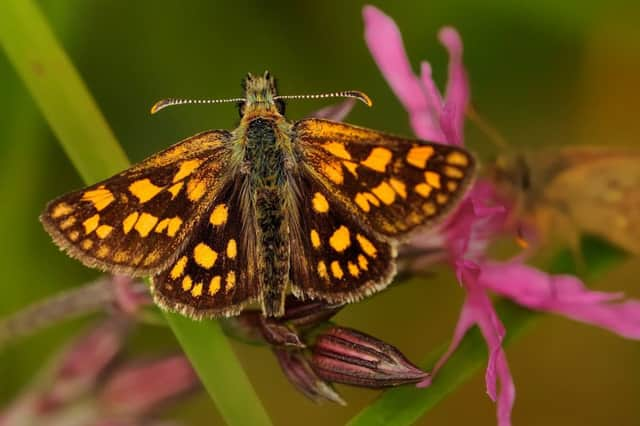Highlands hydro scheme to be built across rare butterfly reserve


Plans for a mile-long renewable energy pipeline through the habitat of one of Britain’s rarest butterflies have been approved.
Highland Council overturned an earlier refusal for a 950kW run-of-river hydro scheme at Allt Mhuic Butterfly Reserve, near Spean Bridge in Lochaber.
Advertisement
Hide AdAdvertisement
Hide AdThe area is home to the chequered skipper butterfly, a species that has battled extinction and is now found only within a 50km radius of Fort William.
Councillors have now reversed an earlier decision by the South Planning Committee to refuse an application by electricity firm Vento Ludens to construct the scheme at Ardechive Cottage in Achnacarry.
The work involves construction of a turbine house, installation of a buried pipe and building of a permanent access road.
The decision comes as a new report reveals one in every three of the UK’s bees and hoverflies are in decline, raising fears over potentially dire consequences for food crops.
The study analysed surveys of 353 wild bee and hoverfly species across the country from 1980 to 2013.
It showed a third have experienced declines in terms of the areas where they were found, while a tenth have expanded.
The findings also showed bee species responsible for pollinating flowering crops such as oil-seed rape have increased.
Overall losses were more notable for pollinator species found in northern Britain, including Scotland.
Advertisement
Hide AdAdvertisement
Hide AdThe researchers believe climate change, industrialisation and green farming practices are all factors affecting how the species fare.
Study leader Dr Gary Powney, from the Centre for Ecology & Hydrology (CEH), said: “We used cutting-edge statistical methods to analyse a vast number of species observations, revealing widespread differences in distribution change across pollinating insects.
“There is no one single cause for these differences, but habitat loss is a likely key driver of the declines.
“While the increase in key crop pollinators is good news, they are still a relatively small group of species.
“Therefore, with species having declined overall, it would be risky to rely on this group to support the long-term food security for our country.
“If anything happens to them in the future there will be fewer other species to step up and fulfil the essential role of crop pollination.”
Dr Claire Carvell, also of CEH, added: “While this analysis sends us a warning, the findings support previous studies suggesting that conservation actions such as wildlife-friendly farming and gardening can have a lasting, positive impact on wild pollinators in rural and urban landscapes.“